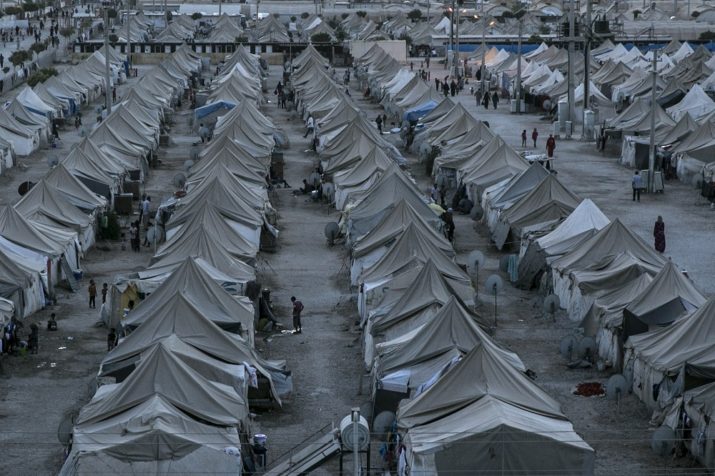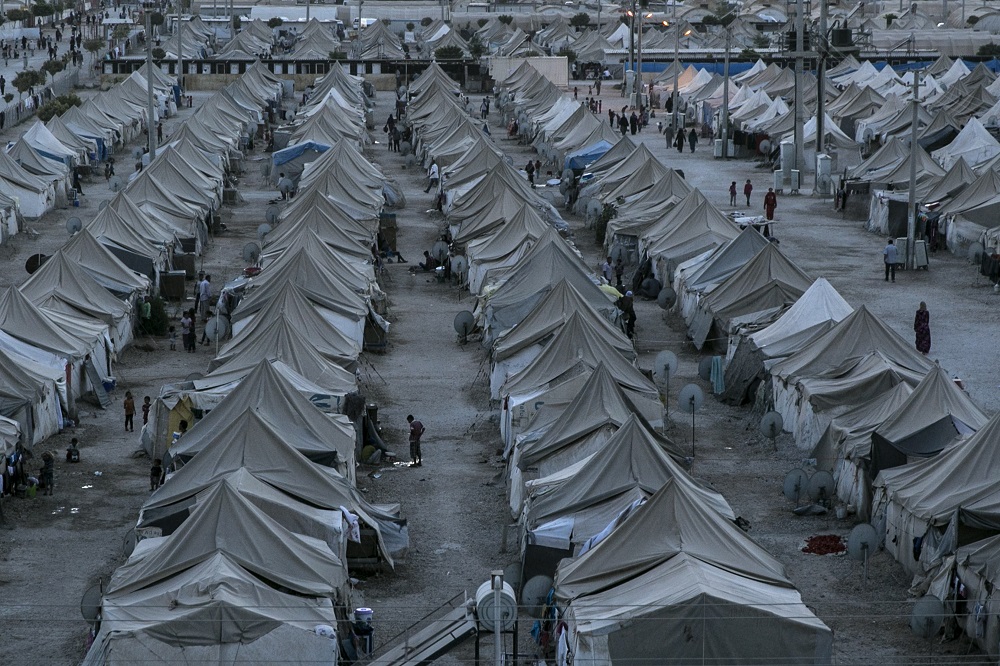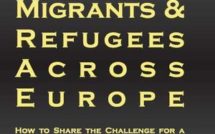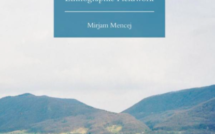

This is part of our special feature on Anxiety Culture.
Racist actions, representations, and speech have become socially acceptable in twenty-first century Europe and Germany. [1] One example: The title page of Focus magazine from January 8, 2016. Here we are dealing with a thoroughly sexualized representation of a woman. We see the body of a naked, white, presumably younger, perhaps 28-year-old, blond-haired woman, whose breasts are covered with her right arm and a red beam that runs diagonally across her body. Her own left hand in contrast coyly shields her pubic area from view. Her eyes are cut out of the frame, but her mouth is in view and slightly open. On her body are visible five paw-like imprints of male hands that mark and simultaneously declare her as possession. They are not colored blue or green, but black: both oily and dirty at once. The title page asks: “After the sex-attacks of migrants: Are we still tolerant or already blind?” (for a deeper analysis of this see Mecheril/van der Haagen Wulff 2016).[2]
In this paper, migration is not only conceived as a phenomenon involving movements of people across borders, but also as a phenomenon of discourses, and to that extent as a phenomenon of hegemonic power relations. The discursive construction of migration is of particular interest to the field of pedagogy, as discourses can be understood to frame educational processes. Furthermore, education is itself part of these discursive relationships.
Migration as the act of crossing borders goes along with both the transformation and the confirmation of existing conditions. Borders (such as those of nation states) become visible in a particular way as they are crossed—they become weak and modified, while at the same time, their power and claim to validity is reinforced. In much the same way, migration leads to the question and strengthening of borders and their validity. Migration therefore has to be understood as a source of disquiet and perturbation, as well as the object of discourses and the subject of conflicts of a political and an every-day nature. In his reflections on discourses, Stuart Hall[3] writes about “the West and the rest,” referring to the special way in which “the West,” “the rest,” and their relationships are represented, and, by extension, the way this knowledge produces a discourse that “[constitutes] a kind of power that is exercized over those about whom ‘something is known.’ When this knowledge is used in practice, those about whom ‘something is known’ are in a specific way made the subject of repression […]. Those who produce the discourse have the power to make it reality, e.g. to enforce its validity and its scientific status.”[4] Discourses about those who count as others make the others what they are, and likewise produce categories of non-others. Discourses on migration are not at all similar or uniform in meaning; they compete with one another, and this competition can be described as a struggle for symbolic dominance or hegemony. Within these struggles, the question whether social, institutional, or identity-based preservation or transformation should be the political aim is discussed with much controversy. Outcomes of these struggles in turn have innovative and restorative effects with regards to social orders.
Affect Functions
Affects and ways of speaking in the European public sphere that are tied to racist differentiations between a natio-racial-culturally coded[5] “Us” and the dangerous, backward “Them” (Not-Us), which furthermore serve to strengthen this differentiation, can be described and understood as a practice of Othering/Selfing with recourse to staged threat scenarios and scenes.
Based upon the psychoanalytical theoretical concepts of Jacques Lacan, the term Othering was newly coined in the theoretical post-colonial context by Gayatri Chakravorty Spivak, and has been widely adopted since the 1970s, particularly in anthropological studies. Lacan’s ideas establish the theoretical framework in which subjectivization and identity formation can be understood, not merely in the solipsistic process of the self, but rather as a constant “mirror dynamic.” According to Spivak, colonized subjects can only be recognized as such through the dominant discursive practices of the colonial centre, and indeed in a dependent relationship with it.[6] Colonizing practices create subjects. Another perspective focuses on exactly those discursive practices that designate some as “others,” and in so doing, create a collective identity. This perspective has become widely known and influential, largely on account of Edward Said’s works on the construction of the “Orient” as an antagonistic foil to the “Occident.” Said did not use the term “othering” himself. However, in the post-colonial context, his thesis was understood as an analysis of a paradigmatic “othering” practice and further developed theoretically. In his work “Orientalism,”[7] Said analyzes the discursive practices that first created “the Orient” and “the Orientals” and places them in a constitutive relationship with the self-perception of the “West.” The mechanisms and the efficacy of these practices can only be understood, according to Said, in the context of European imperialism, and thereby as the legitimation and stabilization practices of claims to dominance in relation to the constructed “other.” In this context, “othering” can be understood as a double process; the “others” are constructed by means of specific knowledge production practices that legitimate the establishment of colonial dominance, and, likewise, it is this hegemonic (political, economic, cultural) intention that makes these epistemic practices appear “plausible” and “useful.”
Thus, we are dealing here with two sides of a coin: the imagination of the other and the process of securing material and symbolic privileges. The staged affect-scenarios that we are witnessing today, the intensity with which, on the one hand, a sense of threat is felt and on the other, the ever-growing danger of becoming a victim of racist incidents, which are then largely ignored or de-thematized in wider society, can only be understood if we are clear that what is at issue here is a battle over sovereignty and positions of privilege, and that this battle requires pictures and imagined constructions of the other.
Three ideal-typical distinct moments of affect can be distinguished here:
(a) With the fear of and the anger against the other it becomes possible to repudiate, legitimate, at any rate uncomfortable, not necessarily explicitly formulated, but clearly apparent demands of others: A paradoxical anger about the suffering of others is currently etched into many people’s voices, postures and faces. The logic of this affect can be explained with reference to the type of anti-Semitism that was particularly relevant to Germany in the second half of the twentieth century and that is called “secondary anti-Semitism,” a hatred against Jews not despite but because of Auschwitz. The Israeli psychoanalyst Zvi Rex sarcastically encapsulates it thus: „The Germans will never forgive the Jews for Auschwitz.”[8] Following this logic: We, who are geo-politically privileged, cannot forgive the asylum seekers and refugees, the waste of the world order,[9] the “disposable populations,”[10] a World Order that was in no small measure created by Western protagonists and instances, and from which the West profited immeasurably, we do not forgive the refugees that they suffer and that with their suffering they invade our living quarters and suburbs and literally get under our skin. That is why they must be demonized, degraded and ultimately dehumanized.
The demonization of the other serves in the maintenance of a hegemonic global order. Within this global order, the prosperity of a privileged minority is established and maintained at the cost of the global Other. The European fishing industry – global waste management – mobile telephones, which could not function without mined coltan from the Kongo – people living in African countries rich in mineral resources live in bitter poverty not least because of national wage-labour politics, that are massively influenced by transnational corporations, both legally and illegally, ecological devastation and the list goes on.
The Wests preservation of an “imperial life-style”[11] necessitates the demonization of those whose bodily presence and associated narrative potential (they too have stories to tell about the world order) is hard to bear for the global privileged minority because it points to the intolerable nature of the global situation form which this privileged minority continues to profit. Capitalism (potentially) not only loses its necessary outside upon which it relies for its continued production through an inbuilt destructive mechanism of continuous expansion and totalization, rather capitalism paradoxically sets up the premise that the shadow beings of those appearing from the periphery manage to enter the interior and in so doing make conscious the inside/outside, centre/periphery divide. One method employed to avoid having to take the fact of global inequality and one’s own responsibility to act into account, is the demonization and symbolic as well as factual repatriation of the others to the outside realm, there, where all the better if directed by their own free will, they belong.
(b) With the fear of and the anger against the Other, it becomes possible to silence and thus avoid addressing the historical, political and economic responsibility that Europe has in creating the current global circumstances, which has to be understood both as a reality from which Europeans continue to profit in no small measure as well as influencing causes for global population movements. The fundamental potential for and concrete crises of a natio-racial-culturally coded Us are potentially lessened by setting the stage for a threat from the outside, through the coming of something or someone from outside. The construction of a “threatened Other” goes hand in hand with that of a “threatened Us.” The generation of threat makes it possible “to align bodies with and against others.”[13] The waste of the world order reminds us that Europe’s prosperity, from a global perspective of existing privilege, needs to be questioned, not so much factually but ethically. The demonizing of the Other functions to avoid the ethical question and thus to preserve individual privileges and the current global order that support them. This means deflecting all direct and indirect questioning of this order, for instance, by discrediting the couriers of the message of inequality in the world, from which Europe is nourished.
(c) With the fear of and the anger against the Other, it becomes possible to enshrine and renew the positive, almost sacred, self-image of Europe. The extent to which asylum seekers, North- Africans, and Muslims are spoken about in a derogatory manner in Germany and Europe, the intensity with which the Other is constructed and staged as sexually dangerous, can only be explained if we are very clear that there is something to lose, namely the status of material privilege and its unquestioned entitlement, but also the idea of a justifiable, reasoned supremacy of a natio-racial-culturally coded “us.” Psychoanalytically speaking, media representations of the fantasized, constructed (“Arabic”, “North-African”, “Muslim”) other can be understood as an attempt to fight that which cannot be accepted within oneself by projecting it onto the abject other (e.g. I as a European man complain so relentlessly about the chauvinism of the allegedly Muslim man by projecting onto and fighting out on his body that which I cannot accept within myself.) This kind of affect is currently so intensely felt and performed in European societies because contained within it is the desire to preserve the self, based on an idealized sacred image of Europe. Europe is contradictory, Europe is the place and project of barbarity, of slavery, the Shoa, the ecological-economic exploitation of the world, of colonialism. Yet Europe is also the place and project of enlightenment, of human rights and the pursuit of a good life for all. Europe is clearly contradictory.[14] However, this contradiction is dissipated and reappropriated in the process of speaking about others. The self-aggrandisement of Europe is a hallmark and an integral part of the European Project and makes visible (typical of “grand narratives,” particularly those with a pronounced sense of superiority) Europe’s constitutive vulnerability and susceptibility to crises. For several reasons, Europe currently finds itself in a fundamental crisis. Europe, in denial of the more than 30,000 dead in the Mediterranean Sea, who lost their lives as a direct result of European border-politics, stages itself as a place of the chosen good, of civilized values, as the cradle of gender equality and, in light of a growing social inequality, duplicitously as a place of social justice. For this political staging the Others are needed, their ugliness, their dangerousness, their savagery. Measured against the phantasmagorical picture of the natio-racial-culturally coded Muslim other, his sexuality and physical intensity, the construction of which goes back in history well before September 11, 2001 and invoked ever since, Europe secures its advantage. Europe’s civility requires the savagery of the others; Europe’s self-imago of holy innocence requires the debased sexuality of the Other.
This phenomenon becomes possible not least because natio-racial-culturally coded distinctions carry within them a religious moment. It is the sacred dimension of natio-racial-culturally coded contexts of belonging that can be powerfully mobilized due to their religiosity. Emile Durkheim[15] traced religion back to the concept of community by introducing as the basis of all religions a fundamental differentiation between the sacred and the profane, whereby he ultimately understood the sacred as symbolising community itself. Whether this interpretation does justice to an understanding of the sacred as such remains open for interpretation; however, in this instance, Durkheim’s religious reflection’s lead us on a theoretical path that allows us to understand the sacred as a symbolising-modus of natio-racial-cultural forms of belonging.
Natio-racial-culturally coded contexts are imagined spaces with a territorial reference. The nation state, for example, can be conceived as a political imagination with the goal of expressing “the will” and defending the interests of a nation living in a specific territory.[16] In order to achieve this goal, it is first and foremost necessary to create “a will” in general and secondly to believe in it. According to the Israeli historian and political scientist Shmuel Eisenstadt,[17] an attempt is made in modern nation states to overcome the tension between the profane and the sacred world. The nation state is “in no way only a secular formation, rather, it takes on the spiritual demands of a religion, complete with accompanying obligations which the individual now has in relation to the state as a whole.”[18] Natio-racial-culturally coded practices of belonging allow for a considerable degree of meaning making that incorporates elements of the sacred and, as such, depends on this sacred element. For this very reason, the occasional recourse to the religious takes place in order to strengthen such natio-racial-culturally imagined derivatives such as “culture/civilisation,” “occident” and “Europe”; or by means of the religious to confirm these constructions, “It is significant that the immediate ‘reaction’ to the visibility of Islam in Europe has less to do with the strengthening of a culture of Christianity and more to do with a culture of political nationalism.”[19]
There seem to be at least two operative modes of creating bonds between individuals to an imagined, anonymous, grand-collective. Firstly, the connections are presented as non-contingent. Secondly, those who participate in this collective and are able to mark themselves as belonging to this grand-collective are rewarded with the increase of self-worth through a participation in an imagined non-profane reality.
The bond with and attachment to a natio-racial-culturally coded context lives from assumptions on the level of social familiarity and proximity, that allow past experiences, one’s own but also mediated experiences, to be projected into the future such that they appear dependable and trustworthy. The imagined natio-racial-culturally coded Us is thus a phantasized Us, that contains not only, but predominantly positive features. This regressive fantasy places natio-racial-cultural embeddedness in a reference frame of previous, fundamentally asymmetrical relations, in which one’s own needs have been satisfied and a deep sense of safety achieved. When this regressive, phantasmagorical moment becomes the focus and natio-racial-cultural coded constructions of Us are mobilized by an increasing regression, then the psychological ground is made fertile that “millions of people” are ready “not so much to kill” for such constructions as nations, the occident or Europe, but “are willing to die for such limited imaginings.”[20]
Paul Mecheril, Dr. phil., Professor for Migration and Education, Department for Pedagogy at the Carl von Ossietzky University of Oldenburg, Germany. He is head of the Center for Migration, Education and Cultural Studies. He received his PhD in Psychology in 1991 (University of Münster, Department of Psychology) and completed his “second book” (Habilitation) at the University of Bielefeld, Department of Pedagogy. His main research interests include: Migration and Pedagogy, Racism, Cultural Studies. Paul Mecheril is the (co-)author of nine and (co-)editor of 26 books. Recently he edited Handbuch Migrationspädagogik (Beltz, 2016), co-edited Dämonisierung der Anderen. Rassismuskritik der Gegenwart (transcript, 2016, with María do Mar Castro Varela), and Resistance. Subjects, Representations, Contexts (transcript 2017, with Martin Butler & and Lea Brenningmeyer).
Monica van der Haagen-Wulff (*1965), Doctorate of Creative Arts (DCA), is an Associate Lecturer at the Chair for Education and Cultural Sociology at the Institute of Comparative Educational Research and Social Sciences at the University of Cologne. Her teaching and research interests include: Cultural Studies, Postcolonial Studies, Gender, Migration, Globalisation, Performance Studies, Theories of Embodiement, Fictocritical Writing, Critical Heritage und Historical Memory Studies. Monica has an intercultural dance and performance background and her main research focus is on how practice and theory can be merged to create new knowledges, and in so doing decentre Eurocentric knowledge constructions. She has published in international academic journals, but she also considers Performance as part of her theoretical output and has performed in Australia and internationally.
A longer version of this paper has been published in German language (Mecheril, P. & van der Haagen-Wulff, M.(2015) Bedroht, angstvoll, wütend. Affektlogik der Migrationsgesellschaft. In: Mecheril, P & Do Mar Castro Varela, M. (Eds.) Die Dämonisierung der Anderen: Rassismuskritik der Gegenwart, Transcript Verlag Bielefeld (p.119-143).
Photo: Sanliurfa Turkey September 23,2015 Aerial view of Akcakale Refugee Camp. Approximately 28.000 Syrian people reside in Akcakale Tent Camp in Urfa.
References:
[1] Zick, A., Küpper, B. & Hövermann, A. (2011) Die Abwertung der Anderen. Eine europäische Zustandsbeschreibung zu Intoleranz, Vorurteilen und Diskriminierung. Berlin: Friedrich-Ebert-Stiftung.
[2] Mecheril, P.& van der Haagen-Wulff, M. (2015) Bedroht, angstvoll, wütend. Affektlogik der Migrationsgesellschaft. In: Mecheril, P & Do Mar Castro Varela, M. (Eds.) Die Dämonisierung der Anderen: Rassismuskritik der Gegenwart, Transcript Verlag Bielefeld (p.119-143).
[3] Hall, St. (1994) Rassismus und kulturelle Identität. Ausgewählte Schriften 2, Hamburg: Argument.
[4] Hall, St. (1994) Rassismus und kulturelle Identität. Ausgewählte Schriften 2, Hamburg: Argument (p. 154).
[5] In our perspective the basic analytical category of migration research is the relationship of individuals and groups to natio-racial-culturally coded orders of belonging, as well as in the transformation of this relationship (Mecheril et al. 2013).The expression natio-racial- cultural (‘natio-ethno-kulturell’, see Mecheril 2003, p.118–251) refers on the one hand to the fact that the concepts of nation, ethnicity, race, and culture are often used in a diffuse and undifferentiated way, both in research and every-day communication. On the other hand, this term indicates the fact that concepts of nation, ethnicity, race, and culture are manifested formally in laws and regulations, materially through border controls and identity documents, and also socially through symbolic practices that generate rather blurred meanings and outcomes that are subsequently used politically (For more detail see: Mecheril, P. (2018).Orders of Belonging and Education: Migration Pedagogy as Criticism.In: D. Bachmann-Medick & J. Kugele (Hrsg.): Migration. Changing Concepts, Critical Approaches (p. 121-138). Berlin: De Grutyer).
[6] Spivak, G. Ch. (1996). The Spivak Reader. Landry, Donna; MacLean, Gerald (Hg.). New York, London: Routledge.
[7] Said, E. W. (1978) Orientalism. New York: Pantheon Books
[8] Gessler, Ph. (2006) Sekundärer Antisemitismus. Argumentationsmuster im rechtsextremistischen Antisemitismus. Bundeszentrale für politische Bildung. www.bpb.de/politik/extremismus/antisemitismus/37962/sekundaerer-antisemitimus?p=all (17. Juli 2016).
[9] Bauman, Z. (2004) Wasted Lives: Modernity and its Outcasts, Cambridge: Polity.
[10] Balibar, E. (2004). We, the People of Europe? Reflections on Transnational Citizenship. Princeton: Princeton University Press.
[11] Brand, U./Wissen. M. (2011). Sozial-ökologische Krise und imperiale Lebensweise. Zu Krise und Kontinuität kapitalistischer Naturverhältnisse. In: Demirovic, A./Dück, J./Becker, F./Bader, P. (Hg.): VielfachKrise. Im finanzdominierten Kapitalismus (S. 79-94). Hamburg: VSA.
[12] Dörre, K. (2013). Landnahme. Triebkräfte, Wirkungen und Grenzen kapitalistischer Wachstumsdynamik. In: Backhouse, M./Gerlach, O./Kalmring, S./Nowak, A. (Hg.): Die globale Einhegung. Krise, ursprüngliche Akkumulation und Landnahmen im Kapitalismus (S. 112- 140). Münster: Westfälisches Dampfboot.
[13] Ahmed, S. (2014). The Cultural Politics of Emotion. Edinburgh: Edinburgh University Press (p.72).
[14] Dhawan, N (2015) Doch wieder! Die Selbst-Barbarisierung Europas. In: Mecheril, P & Do Mar Castro Varella, M. (Eds.) Die Dämonisierung der Anderen: Rassismuskritik der Gegenwart, Transcript Verlag Bielefeld (p. 73-97).
[15] Durkheim, É. (1981). Die elementaren Formen des religiösen Lebens. Frankfurt a.M.: Suhrkamp
[16] Brubaker, R. (1994). Staats-Bürger: Deutschland und Frankreich im historischen Vergleich. Hamburg: Junius (p. 53).
[17] Eisenstadt, S. N./Schluchter, B. (2000). Die Vielfalt der Moderne. Weilerswist: Velbrück Wissenschaft
[18]. Knoblauch, H. (2009). Populäre Religion. Auf dem Weg zu einer spirituellen Gesellschaft. Frankfurt a.M.: Campus (p. 35).
[19]. Ibid., (p.37)
[20] Anderson, B. (1998). Die Erfindung der Nation. Zur Karriere eines folgenreichen Konzepts. Berlin: Ullstein (S.16)
Published on July 2, 2018.




